Plot summary
An expedition from an imperialistic culture, led by a man hungry for power and riches known as Commander Frank, and accompanied by an "adept of the Universal Assembly" (a body of men apparently in communion with a higher power) arrives in a series of ships, with some difficulty—the ships land far from their intended destination, being "unsuited to atmospheric navigation"—and encounter the natives. Though the natives are civilized and capable of mustering armies in great number, their technology is inferior to that of the invaders. Despite being few in number, by guile and treachery the expedition is led to victory over the natives, culminating in the capture of their priest-god-king.
Time goes by and the leaders consolidate their gains, only to be undone by political maneuvering from those who arrive later in the conquered lands. Commander Frank is eventually assassinated by the sons of a defeated rival. As he dies, he makes the Sign of the Cross with his blood on the floor and cries out, "Jesus!". The story concludes: "And thus died Francisco Pizarro, the Conqueror of Peru."
Epilogue
Far from being a pulp yarn, the story is revealed to be an account of actual history, albeit one carefully mis-told. Having pulled off his deception, the author explains at length how not one word of the story was actually untrue. Nothing was described as being anything but what it was, although it was done in such a way as to invite the reader to imagine something else. "Universal Assembly" is simply a literal translation of Ekklesia Katholikos, or the "Catholic Church." The "power metal" which drove the Golden Empire was gold-197, because that is the only naturally occurring isotope of gold, and the "power" it brought was economic and political. The ships were never described as flying, and indeed the author did write that they "were not suited to atmospheric navigation". He protests that he had to abandon his intended last words for the leader ("I'm going to Heaven, and you, you bastards, can go to Hell!") in favor of Pizarro's actual last utterance, which was recorded as being "Jesus!" after he drew the sign of the cross in his own blood.
Being published in March, the story was, in effect, an early April Fools' Day prank. It was re-published in collections of Randall Garrett's works, and an anthology entitled Analog's Lighter Side edited by Stanley Schmidt.
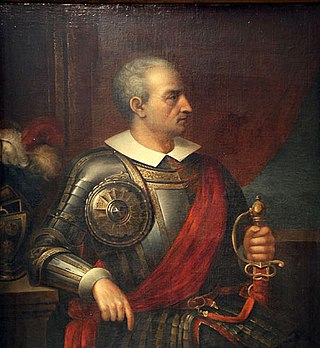
Diego de Almagro, also known as El Adelantado and El Viejo, was a Spanish conquistador known for his exploits in western South America. He participated with Francisco Pizarro in the Spanish conquest of Peru. While subduing the Inca Empire he laid the foundation for Quito and Trujillo as Spanish cities in present-day Ecuador and Peru, respectively. From Peru, Almagro led the first Spanish military expedition to central Chile. Back in Peru, a longstanding conflict with Pizarro over the control of the former Inca capital of Cuzco erupted into a civil war between the two bands of conquistadores. In the battle of Las Salinas in 1538, Almagro was defeated by the Pizarro brothers and months later he was executed.

Hernán Cortés de Monroy y Pizarro Altamirano, 1st Marquess of the Valley of Oaxaca was a Spanish conquistador who led an expedition that caused the fall of the Aztec Empire and brought large portions of what is now mainland Mexico under the rule of the King of Castile in the early 16th century. Cortés was part of the generation of Spanish explorers and conquistadors who began the first phase of the Spanish colonization of the Americas.
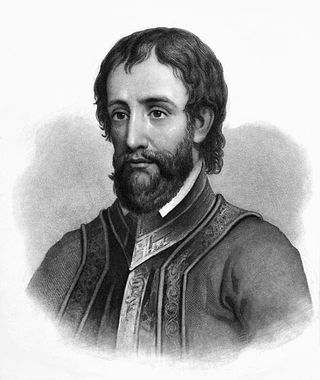
Hernando de Soto was a Spanish explorer and conquistador who was involved in expeditions in Nicaragua and the Yucatan Peninsula. He played an important role in Francisco Pizarro's conquest of the Inca Empire in Peru, but is best known for leading the first European expedition deep into the territory of the modern-day United States. He is the first European documented as having crossed the Mississippi River.
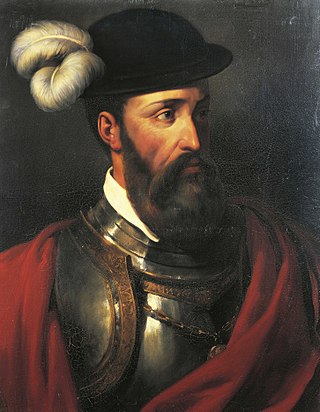
Francisco Pizarro, Marquess of the Atabillos was a Spanish conquistador, best known for his expeditions that led to the Spanish conquest of the Inca Empire.

Francisco de Orellana was a Spanish explorer and conquistador. In one of the most improbably successful voyages in known history, Orellana managed to sail the length of the Amazon, arriving at the river's mouth on 24 August 1542. He and his party sailed along the Atlantic coast until reaching Cubagua Island, near the coast of Venezuela.

Aguirre, the Wrath of God is a 1972 epic historical drama film produced, written and directed by Werner Herzog. Klaus Kinski stars in the title role of Spanish soldier Lope de Aguirre, who leads a group of conquistadores down the Amazon River in South America in search of the legendary city of gold, El Dorado. The accompanying soundtrack was composed and performed by kosmische musik band Popol Vuh. The film is an international co-production between West Germany and Mexico.

Conquistadors or conquistadores is the term used to refer to Spanish and Portuguese soldiers and explorers who carried out the conquests and explorations of the Age of Discovery. Conquistadors sailed beyond the Iberian Peninsula to the Americas, Oceania, Africa and Asia, establishing new colonies and trade routes. They brought much of the "New World" under the dominion of Spain and Portugal.

El Dorado is a mythical city of gold supposedly located somewhere in South America. The king of this city was said to be so rich that he would cover himself from head to foot in gold dust – either daily or on certain ceremonial occasions – before diving into a sacred lake to wash it off. The legend was first recorded in the 16th century by Spanish colonists in America; they referred to the king as El Dorado, 'the golden one', a name which eventually came to be applied to the city itself.

Gordon Randall Phillip David Garrett was an American science fiction and fantasy author. He was a contributor to Astounding and other science fiction magazines of the 1950s and 1960s. He instructed Robert Silverberg in the techniques of selling large quantities of action-adventure science fiction, and collaborated with him on two novels about men from Earth disrupting a peaceful agrarian civilization on an alien planet.
Lord Darcy is a detective in a fantasy alternate history, created by Randall Garrett. The first stories were asserted to take place in the same year as they were published, but in a world with an alternate history that is different from the real world and that is governed by the rules of magic rather than the rules of physics. Despite the magical trappings, the Lord Darcy stories play fair as whodunnits; magic is never used to "cheat" a solution, and indeed, the mundane explanation is often obscured by the leap to assume a magical cause.

The Age of Discovery, also known as the Age of Exploration, was part of the early modern period and largely overlapped with the Age of Sail. It was a period from approximately the late 15th century to the 17th century, during which seafarers from a number of European countries explored, colonized, and conquered regions across the globe. The Age of Discovery was a transformative period in world history when previously isolated parts of the world became connected to form the world-system and laid the groundwork for globalization. The extensive overseas exploration, particularly the opening of maritime routes to the Indies and the European colonization of the Americas by the Spanish and Portuguese, later joined by the English, French and Dutch, spurred in the International global trade. The interconnected global economy of the 21st century has its origins in the expansion of trade networks during this era.

The Adventurer is a novel by Finnish author Mika Waltari, published in 1948. It is a fictional tale of a young Finnish man, Mikael Karvajalka (Hairy-foot), set in 16th century Europe. Mikael is portrayed as an intellectual but rather naive person. Beginning life as an orphan bastard, he pursues a better social position with help of friendly people and by means of theological studies, but ends up drifting along through historical events across Europe rather than being able to steer his life himself.
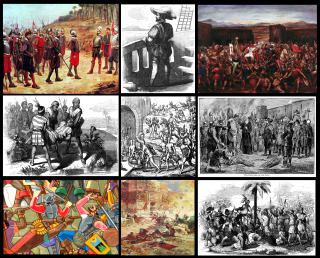
The Spanish conquest of the Inca Empire, also known as the Conquest of Peru, was one of the most important campaigns in the Spanish colonization of the Americas. After years of preliminary exploration and military skirmishes, 168 Spanish soldiers under conquistador Francisco Pizarro, along with his brothers in arms and their indigenous allies, captured the last Sapa Inca, Atahualpa, at the Battle of Cajamarca in 1532. It was the first step in a long campaign that took decades of fighting but ended in Spanish victory in 1572 and colonization of the region as the Viceroyalty of Peru. The conquest of the Inca Empire, led to spin-off campaigns into present-day Chile and Colombia, as well as expeditions to the Amazon Basin and surrounding rainforest.
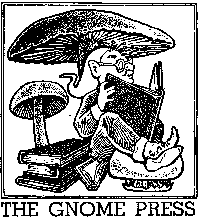
Gnome Press was an American small-press publishing company active 1948 – 1962 and primarily known for fantasy and science fiction, many later regarded as classics.
Diego de Almagro II, called El Mozo, was the son of Spanish conquistador Diego de Almagro and Ana Martínez, a native Panamanian Indian woman.
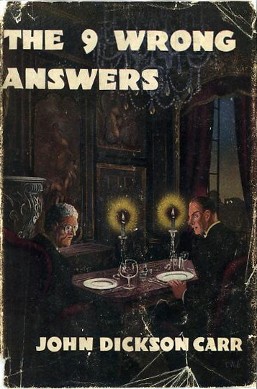
The Nine Wrong Answers, first published in 1952, is a detective story by John Dickson Carr which does not feature any of his series detectives. It is an expansion of Carr's 1942 radio play "Will You Make A Bet With Death".

The first European to discover Chile was Ferdinand Magellan, in 1520, following the passage in the Strait which bears his name on a wall, at the southern tip of Latin America. Following the conquest of Aztec Empire by Hernán Cortés between 1518 and 1521, a new wave of territorial expansion occurs in the direction of the Inca Empire from 1532. This is done by Francisco Pizarro. The conquest of part of Chile started from 1535. This conquest is in a particular context and results in a partial settlement of the Spaniards in today's Chile.
Gordon MacCreagh was an American writer.
Columbia Publications was an American publisher of pulp magazines featuring the genres of science fiction, westerns, detective stories, romance, and sports fiction. The company published such writers as Isaac Asimov, Louis L'Amour, Arthur C. Clarke, Randall Garrett, Edward D. Hoch, and William Tenn; Robert A. W. Lowndes was an important early editor for such writers as Carol Emshwiller, Edward D. Hoch and Kate Wilhelm.

All the White Spaces is an alternate history, horror and supernatural novel by English writer Ally Wilkes. It is her debut novel and was first published in the United Kingdom in January 2022 by Titan Books. It is about a trans man who joins an expedition to Antarctica in 1920, where he is tormented by supernatural apparitions.















